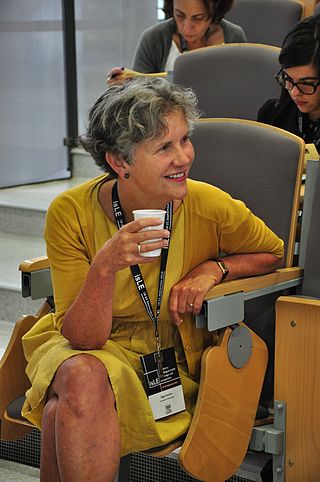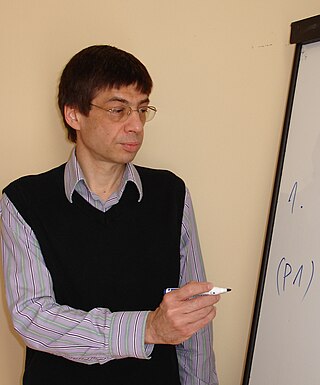Related Research Articles

Generative grammar, or generativism, is a linguistic theory that regards linguistics as the study of a hypothesised innate grammatical structure. It is a biological or biologistic modification of earlier structuralist theories of linguistics, deriving from logical syntax and glossematics. Generative grammar considers grammar as a system of rules that generates exactly those combinations of words that form grammatical sentences in a given language. It is a system of explicit rules that may apply repeatedly to generate an indefinite number of sentences which can be as long as one wants them to be. The difference from structural and functional models is that the object is base-generated within the verb phrase in generative grammar. This purportedly cognitive structure is thought of as being a part of a universal grammar, a syntactic structure which is caused by a genetic mutation in humans.

Laura A. Michaelis is a Professor in the Department of Linguistics and a faculty fellow in the Institute of Cognitive Science at the University of Colorado Boulder.
Eloise Jelinek was an American linguist specializing in the study of syntax. Her 1981 doctoral dissertation at the University of Arizona was titled "On Defining Categories: AUX and PREDICATE in Colloquial Egyptian Arabic". She was a member of the faculty of the University of Arizona from 1981 to 1992.
Anna Maria Di Sciullo is a professor in the Linguistics Department at the Université du Québec à Montréal and visiting scientist at the Department of Linguistics at New York University. Her research areas are Theoretical Linguistics, Computational Linguistics and Biolinguistics.
Lisa deMena Travis is a researcher and educator in the field of linguistics, specializing in syntax and in the study of Austronesian languages such as Malagasy and Tagalog. She is currently a professor of linguistics at McGill University. Her 1984 proposal of the Head Movement Constraint, which seeks to account for limitations on the movement of syntactic heads in question formation, has become a cornerstone of generative linguistics.
Jane Barbara Grimshaw is a Distinguished Professor [emerita] in the Department of Linguistics at Rutgers University-New Brunswick. She is known for her contributions to the areas of syntax, optimality theory, language acquisition, and lexical representation.

Olga Fischer is a Dutch linguist and an expert on the English language. She is Professor Emerita of Germanic Linguistics at the University of Amsterdam and former president of the International Society for the Linguistics of English.
Lisa Cheng is a linguist with specialisation in theoretical syntax. She is a Chair Professor of Linguistics and Language at the Department of Linguistics, Leiden University, and one of the founding members of the Leiden Institute for Brain and Cognition.

Artemis Alexiadou is a Greek linguist active in syntax research working in Germany. She is professor of English linguistics at the Humboldt University of Berlin.
Hilda Judith Koopman is a linguist who does research and fieldwork in the areas of syntax and morphology. She is a professor in the department of Linguistics at the University of California, Los Angeles, and is the director of the SSWL database. The SSWL, which she together with Dennis Shasha inherited from Chris Collins at New York University NYU, is an open-ended database of syntactic, morphological, and semantic properties.
Lexicalist hypothesis is a hypothesis proposed by Noam Chomsky in which he claims that syntactic transformations only can operate on syntactic constituents. The hypothesis states that the system of grammar that assembles words is separate and different from the system of grammar that assembles phrases out of words.

András Kertész is a Hungarian linguist, professor, full member of the Hungarian Academy of Sciences. His research focuses on the philosophy of linguistics, theoretical linguistics and foundational problems of syntax, semantics and pragmatics. He works both in Hungary and around the world, and has published in English, German and Hungarian.
Liliane Madeleine Victor Haegeman ARB is a Belgian professor of linguistics at Ghent University. She received her PhD in English linguistics in 1981 from Ghent University, and has written numerous books and journal articles thereafter. Haegeman is best known for her contributions to the English generative grammar, with her book Introduction to Government and Binding Theory (1991) well established as the most authoritative introduction on the Principles and Parameters approach of generative linguistics. She is also acknowledged for her contributions to syntactic cartography, including works on the left periphery of Germanic languages, negation and discourse particles, and adverbial clauses. As a native speaker of West Flemish, her research has also touched upon the comparative study of English and West Flemish in terms of the subject position and its relation to the clausal structure.
Sabine Iatridou is a linguist whose research investigates the syntax‐semantics interface. Her research has helped to delineate theories of tense and modality.
Ans van Kemenade is a Dutch professor of English linguistics at the Radboud University Nijmegen specializing in the history of the English language.
Geoffrey Horrocks is a British philologist and Emeritus Professor of Comparative Philology at the University of Cambridge.
Shanley E. M. Allen is a professor of linguistics working at the Technical University of Kaiserslautern. Her research is primarily in the area of psycholinguistics and language acquisition, studying both monolingual and multilingual speakers. She is also a specialist on the Inuktitut language.
Henk van Riemsdijk is a Dutch linguist and professor emeritus at Tilburg University.
Johanna Laakso is a Finnish linguist and Finno-Ugrist based at the University of Vienna.
Maria Koptjevskaja-Tamm is a Russian-born linguist and typologist who is Professor of General Linguistics at Stockholm University.
References
- ↑ "Elena Anagnostopoulou – Curriculum vitae" (PDF). Archived (PDF) from the original on 2019-10-20.
- ↑ "Academic homepage" . Retrieved 2019-10-20.
- ↑ "Elena Anagnostopoulou". scholar.google.com. Retrieved 2021-03-08.
- ↑ "Bessel Award selection decisions since 2013" . Retrieved 2019-10-20.
- ↑ "Academia Europaea membership page" . Retrieved 2019-10-20.